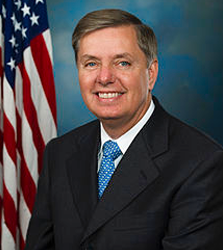
Has Lindsey Graham’s Moment Arrived?
The atrocity in Paris committed by the terrorist group Islamic State has the potential to shift the 2016 nomination contests in both parties, according to several political analysts and observers. The Washington Post earlier offered its thoughts on the issue:
Paris massacre could alter the 2016 presidential race in this country
The deadly rampage in Paris on Friday thought to have been carried out by the Islamic State has introduced a new dynamic into this country’s 2016 presidential campaign, increasing the pressure on candidates in both parties to project resolve and clarity about how they would deal with the threat….
The attacks in Paris also raised a question for Republican voters: Will they continue to be drawn to the bellicose rhetoric most exemplified by front-running political outsider Donald Trump, or turn instead toward the experience of some of the current and former senators and governors in the race?
The article suggests that on the Democratic side, former Secretary of State Hillary Clinton would be the natural beneficiary of national security and foreign policy becoming bigger issues in the campaign, provided she isn’t tagged as being partly responsible for a troubled Middle East. On the Republican side, the Post cites Trump, former Florida Gov. Jeb Bush and Florida Sen. Marco Rubio as three who might benefit politically from the new focus.
Roll Call offers another option: South Carolina Sen. Lindsey Graham, who has made national security and the war on terror the centerpiece of his campaign. From the article:
“This is the defining moment for Lindsey Graham’s campaign. What he does with this moment will make or break his campaign,” said Michael Dennehy, a New Hampshire political consultant who worked for McCain in his 2000 and 2008 campaigns. “The question is will he say something unique enough to differentiate himself from the other candidates, will he be covered by the media, and will he use paid media to back up his message?”
Dennehy, a former executive director of the New Hampshire GOP, said it’s been difficult for anyone in the second-tier of GOP candidates such as Graham to get an earned media megaphone, even in a small state.
The death toll from the Paris attacks and the spotlight on Syria and ISIS also could shift focus to Graham, who has long touted his defense and foreign policy credentials….
It’s unlikely that the national security alone could propel Graham into contention. But a lower-tier candidate like Graham, otherwise starved for media attention, would undoubtedly benefit from increased coverage that might get him noticed by enough voters to at least spark some interest in his candidacy and a rise in polls, possibly even enough to qualify for the main stage in the next Republican debate.
If he qualifies for that debate, Graham has considerable communication skills that could allow him to do well, particularly if national security issues remain a focus. The Leadership Project for America’s profile of Graham described his speaking abilities this way:
Graham is regarded as a fairly effective communicator as a politician, and is a frequent guest on national news programs, particularly in areas related to national security. He has been described as having a “well-deserved reputation for being good humored,” and his recent speeches before conservative and Republican audiences have been well regarded.
His frequent appearances on television combined with his legal experience have made him a sharp and persuasive debater, and he is likely to benefit from the Republican presidential debates.
Candidates with a singular focus on one issue tend not to ultimately fare well in presidential nomination contests. But that focus can benefit a candidate in propelling them into contention if the issue suddenly becomes highly salient to large number of voters. Graham has his opportunity now; the question is whether he can make the most of it.



